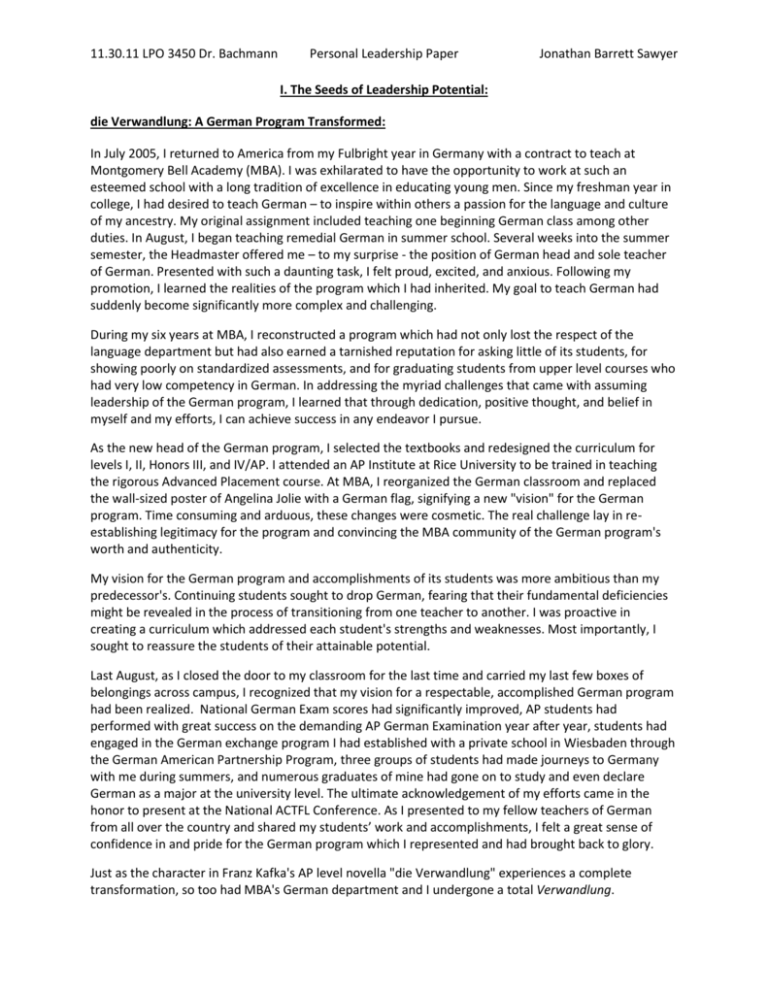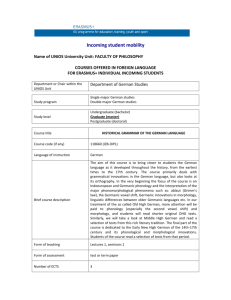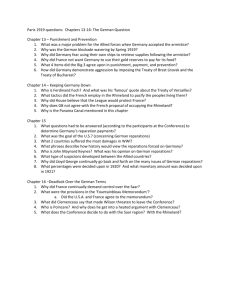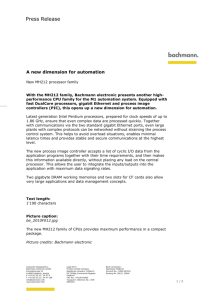Personal Leadership Paper
advertisement

11.30.11 LPO 3450 Dr. Bachmann Personal Leadership Paper Jonathan Barrett Sawyer I. The Seeds of Leadership Potential: die Verwandlung: A German Program Transformed: In July 2005, I returned to America from my Fulbright year in Germany with a contract to teach at Montgomery Bell Academy (MBA). I was exhilarated to have the opportunity to work at such an esteemed school with a long tradition of excellence in educating young men. Since my freshman year in college, I had desired to teach German – to inspire within others a passion for the language and culture of my ancestry. My original assignment included teaching one beginning German class among other duties. In August, I began teaching remedial German in summer school. Several weeks into the summer semester, the Headmaster offered me – to my surprise - the position of German head and sole teacher of German. Presented with such a daunting task, I felt proud, excited, and anxious. Following my promotion, I learned the realities of the program which I had inherited. My goal to teach German had suddenly become significantly more complex and challenging. During my six years at MBA, I reconstructed a program which had not only lost the respect of the language department but had also earned a tarnished reputation for asking little of its students, for showing poorly on standardized assessments, and for graduating students from upper level courses who had very low competency in German. In addressing the myriad challenges that came with assuming leadership of the German program, I learned that through dedication, positive thought, and belief in myself and my efforts, I can achieve success in any endeavor I pursue. As the new head of the German program, I selected the textbooks and redesigned the curriculum for levels I, II, Honors III, and IV/AP. I attended an AP Institute at Rice University to be trained in teaching the rigorous Advanced Placement course. At MBA, I reorganized the German classroom and replaced the wall-sized poster of Angelina Jolie with a German flag, signifying a new "vision" for the German program. Time consuming and arduous, these changes were cosmetic. The real challenge lay in reestablishing legitimacy for the program and convincing the MBA community of the German program's worth and authenticity. My vision for the German program and accomplishments of its students was more ambitious than my predecessor's. Continuing students sought to drop German, fearing that their fundamental deficiencies might be revealed in the process of transitioning from one teacher to another. I was proactive in creating a curriculum which addressed each student's strengths and weaknesses. Most importantly, I sought to reassure the students of their attainable potential. Last August, as I closed the door to my classroom for the last time and carried my last few boxes of belongings across campus, I recognized that my vision for a respectable, accomplished German program had been realized. National German Exam scores had significantly improved, AP students had performed with great success on the demanding AP German Examination year after year, students had engaged in the German exchange program I had established with a private school in Wiesbaden through the German American Partnership Program, three groups of students had made journeys to Germany with me during summers, and numerous graduates of mine had gone on to study and even declare German as a major at the university level. The ultimate acknowledgement of my efforts came in the honor to present at the National ACTFL Conference. As I presented to my fellow teachers of German from all over the country and shared my students’ work and accomplishments, I felt a great sense of confidence in and pride for the German program which I represented and had brought back to glory. Just as the character in Franz Kafka's AP level novella "die Verwandlung" experiences a complete transformation, so too had MBA's German department and I undergone a total Verwandlung. 11.30.11 LPO 3450 Dr. Bachmann Personal Leadership Paper Jonathan Barrett Sawyer Personally, I had grown throughout my six years from being a novice teacher uncertain of his own capabilities into an experienced, self-assured leader of a respectable German program. Secure in my talents, abilities, and potential for success, I prepared myself to face whatever challenges were ahead in graduate school. II. A Student of Theory: The Shaping of my Leadership Philosophy & an Analysis of Potential In my role as a teacher, I first discovered and explored my leadership potential, and I am now determined to enhance my talents, skills, and experiences through continued study and reflection in my coursework. In my first semester in LOP, I have engaged in much thought on leadership styles, traits, philosophies and best practices. With that new knowledge, I can now begin to chart a course forward - a path that will allow me ultimately to achieve my greatest potential as a leader. Through my experiences as a teacher and as a current student of leadership theory, I have begun to develop a personal philosophy of leadership. I believe the following to be true of leadership: Traits and Personality influence leadership style and predisposition to leadership. Situational Leadership and Path-Goal Theory Leadership are complementary, and by using the two approaches in conjunction, a leader can best meet the needs of his subordinates. People – for the most part – are motivated by goals, and a successful leader helps subordinates along the path to their goals, and he helps cultivate within his followers a sense of authentic worth and purpose. A leader inspires self-worth and efficacy. A successful leader is both high task and high relationship oriented. What follows is an analysis of my leadership philosophy and how my life experiences match up with it at this point in my professional and educational career. In my analysis, I acknowledge personal strengths, weaknesses and deficiencies, behaviors of which I should be cautious, and common pitfalls of leaders with similar characteristics. I conclude with a plan for continued leadership growth and edification. A. Strengths & Weaknesses- Key Traits, Personality, MBTI, and SDI: According to Northouse, the traits identified through research to be most strongly correlated to leadership are intelligence, self-confidence, determination, integrity, and sociability (2010). Results of MBTI (Myers-Briggs Type Inventory) and SDI (Strengths Deployment Inventory) assessments also help provide valuable insight into leadership potential, personality traits, and behavioral tendencies. 1. Major Leadership Traits: Intelligence- a personal strength Strong verbal ability, perceptual ability, and reasoning appear to make one a better leader (Northouse 2010). Based upon this supposition, my results on the Wechsler Adult Intelligence Scale 3rd edition (WAIS III) would indicate strong leadership potential. My verbal ability - a measure of acquired knowledge, verbal reasoning, and comprehension of verbal information – is in the superior range and above 95% of my peers (VIQ=125, 95% confidence interval, 119-129). Furthermore, my verbal comprehension index (VCI) – a measure of verbal acquired knowledge 11.30.11 LPO 3450 Dr. Bachmann Personal Leadership Paper Jonathan Barrett Sawyer and verbal reasoning, ability to understand and respond to verbally presented material - is equal to or exceeds that of 96% of my peers (VCI=126, 95% confidence interval, 119-131). In terms of perceptual ability and reasoning, my perceptual organization index (POI) – a measurement of fluid reasoning, spatial processing, attentiveness to detail, and visual motor integration – exceeds that of 63% of my peers (POI= 105, 95% confidence interval, 97-112). Beyond intelligence tests, my academic history speaks to high achievement. In my undergraduate career at Vanderbilt, I double majored in German and Political Science and graduated summa cum laude #22 of 888 in the school of Arts and Science. Upon graduation, I was selected to be a Fulbright Scholar in Germany for 2004-2005. My intelligence allows me to approach situations, conflict, new challenges, and tasks with great ability to perceive, reason, and conceptualize. Furthermore, my verbal abilities afford me the faculty to express myself clearly both in the written and spoken word. A leader’s abilities to speak with conviction, to choose his words wisely, and to work through situations with a clear mode of reasoning are critical to his efficacy. Self Confidence- a work in progress The ability to be certain about one’s competencies and skills, self-confidence includes self-esteem, selfassurance and the belief that one can make a difference. Critical to leadership, it allows a leader to feel that his attempts to influence others are appropriate and right (Northouse 2010). Confidence and assurance are developed over time and through experience. As a result of my experiences and responsibilities as a high school teacher and a Fulbright Scholar teaching ESL at a German Gymnasium, I have begun to realize my leadership potential. That said, I have always struggled to have confidence in my work and my abilities in the moment. I can look back upon my work with students, and I now know that I made a difference - I inspired within them a love of German language and culture and an appreciation for global diversity. While I was teaching, however, I always questioned my efforts and influence. It is only after I have gained perspective on a project or an accomplishment that I can begin to acknowledge success and feel a sense of assurance about my work. I know that this is an area of potential weakness for me as a leader. In order to be most effective and influential, I must not only portray confidence but also believe fully in my potential to lead others, to inspire within them drive and dedication, and to make a difference. Determination – a personal strength Defined by Northouse as the desire to get the job done, initiative, persistence, dominance and drive, determination is characteristic of a high achiever, and it helps a leader persevere in the face of obstacles (2010). A determined leader is also proactive. 11.30.11 LPO 3450 Dr. Bachmann Personal Leadership Paper Jonathan Barrett Sawyer I have always seen myself as a “worker bee,” someone who dives into a task, works on it methodically and conscientiously, and sees it through to completion. I also believe that my academic successes as a high achiever speak to my determination. Professionally, the immediate promotion to head of the German Department tested my determination. Weeks before the start of school, I had to face obstacles head on, chart a course for excellence, redesign four levels of curriculum, and become trained to teach the AP level class. When school started, I had managed to accomplish or at least set into motion the drivers for change in each arena. My determination had kicked in fully. Based on these experiences, I know that I – as an individual and as a leader - am determined, that nothing can stop me from seeing a problem through to its solution, and that I have the drive to endeavor for greatness. Integrity- a personal strength The qualities of honesty, trustworthiness, loyalty, and reliability constitute integrity. A man of integrity adheres to a strong set of core principles, takes responsibility for his actions, and inspires confidence in others (Northouse 2010). For my entire life, I have either been a student at or worked in schools with a strong sense of purpose, core values, and a mission. For K-8, I attended Louisville Collegiate School, where the core values are respect, honor, responsibility, and compassion. For high school, I attended St. Xavier High School. As a college preparatory school, St. X strives to build a Catholic community of faith that calls young men to embrace Gospel values and prepares them to share in the life of God through lives of generous service to the world. St. X challenges students to grow intellectually and to think critically, and it helps students develop leadership skills, self-discipline and the attitudes essential for becoming confident, capable and responsible stewards in a global society (saintx.com). At Vanderbilt, my alma mater and current graduate school, a former dean, Madison Sarratt, once said, “Today I am going to give you two examinations, one in trigonometry and one in honesty. I hope you will pass them both, but if you must fail one, let it be trigonometry.” In my professional experience, I worked at Montgomery Bell Academy, a college prep school for young men. MBA’s motto is “Gentleman, Scholar, Athlete.” Embedded in the school’s motto is the expectation that each young man live his life striving for those ideals – to be a gentleman in all aspects of life, to engage in lifelong learning, and to embrace fitness and wellbeing of mind and body. As a student and teacher at institutions that esteem a core set of values, I have developed over time convictions of honesty, compassion, responsibility, and loyalty. As a leader, I will attempt to lead with an open mind while also remaining true to my solid foundation of principles and values. I believe that if I can do so, my followers will have confidence in me. Sociability- a personal strength A leader’s inclination to seek out pleasant social relationships, to be friendly, outgoing, courteous, tactful, diplomatic, and sensitive to others’ needs, sociability is also a key trait of an effective leader (Northouse 2010). Leaders who demonstrate the trait of sociability show concern for the well-being of their subordinates, and they work to create cooperative relationships at work. 11.30.11 LPO 3450 Dr. Bachmann Personal Leadership Paper Jonathan Barrett Sawyer I have always identified as a people person, a people pleaser. I am also a middle child. As the middle child, I have always worked to bring everyone together in my family, to be the intermediary between parties when conflicts have arisen, and to be the one who remembers and honors special anniversaries and occasions. My friends and coworkers have also always told me that I am such a good listener. I truly invest in my personal relationships and care for my friends’ success and happiness. I want to bring joy to them, to help them through troubles, and aid them in any way I can to help them achieve their goals. 2. MBTI- Myers-Briggs Type Inventory: Many of the traits examined above align with my MBTI personality assessment. My results identify me most closely as an ESFJ – extravert, sensing, feeling, judging. ESFJs enjoy meeting people and are friendly, outgoing, and talkative. Additionally, they place a high value on relationships, are very concerned with the feelings of others, and are eager to please in real and tangible ways. ESFJs also have good energy for projects, tasks, and activities. ESFJs are also hardworking, dedicated, organized, efficient, and conscientious. They are willing to put large amounts of energy into the things they believe in, to follow through on commitments, and to work on collaborative teams (The Personality Type Tool Kit 2001). In the workplace and as leaders, ESFJs typically pay close attention to others’ needs and wants, respect rules and authority, lead through personal attention to others, gain good will through good relationships, keep people well informed, set an example of hard work and follow-through, and uphold organizational traditions. ESFJs prefer to work with conscientious, cooperative people who are goal oriented, organized, friendly, sensitive, appreciative, and compassionate (Bachmann supplementary material ESFJ). ESFJs have to be wary of potential pitfalls and weaknesses. Because they seek harmony in relationships, ESFJs tend to avoid conflict and seldom risk hurting anyone’s feelings. As a leader, this could be problematic, for a leader must be able to confront conflict directly and manage it successfully. Conflict is, at times, necessary and even productive. Intellectual conflict discourse promotes an innovative, critically-thinking workplace. ESFJs may also have trouble seeing the big picture, and they may need help looking past the immediate to the future implications of their choices and decisions. Lastly, ESFJs may not value their own priorities and wellbeing enough because of a desire to serve and please others. As I evaluate my ESFJ tendencies – both positive and negative – I see strengths and weaknesses in my leadership disposition. I also see areas for improvement and development. 3. SDI- Elias Porter’s Strengths Deployment Inventory: The results of my SDI assessment show that I am motivated primarily by an altruistic-nurturing (blues) system and secondarily by an analytic-autonomizing (green) values system. I will first look at my blue tendencies, and I will then examine my less pronounced green propensities. In examining each tendency, I will evaluate the associated strengths and potential weaknesses. A blue oriented individual/leader bases a sense of personal integrity on being genuinely helpful to others and is seen as supportive. He feels a sense of success and fulfillment in seeing others achieve 11.30.11 LPO 3450 Dr. Bachmann Personal Leadership Paper Jonathan Barrett Sawyer success and fulfillment. A blue leader also recognizes the utility and productivity of exercising concern for the welfare of others. Blues typically exert influence and leadership through reconciling differences, promoting harmony and good will, and by supporting individuals and their needs and wants. Blue leaders judge others in terms of who is helpful/who is selfish and who is friendly/who is aggressive, and they typically feel that rewards should go to those who are most helpful (Bachmann supplementary materials SDI). Blues experience the greatest satisfaction from being needed, liked, and thanked. They are uncomfortable and feel threatened in situations where individuals are angry and/or indifferent. They tend to view themselves as needing to be more hard headed and aggressive, and they seek to protect themselves from acting angry or selfish. Green leaders derive success in managing resources, and they understand the value of exercising judicious foresight. They establish influence and exert leadership through establishing order, planning ahead, and analyzing (Bachmann supplementary materials SDI). These are the only tendencies from the analytic-autonomizing values system with which I feel that I personally identify. Defined by the SDI and Porter as strengths that are overdone, weaknesses can be addressed and brought back into alignment with the values system (Porter 2005). Potential weaknesses for me are numerous when I consider the SDI. My blue strength of being trusting could be taken too far, and I could be viewed by subordinates as being gullible and/or naïve. I also risk being seen as spineless or unable to face conflict. This same weakness was identified earlier when looking at some potential pitfalls for ESFJ type personalities. Another potential weakness for a blue leader is modesty. Modesty, when overdone, is perceived as being self-effacing. Followers do not feel inspired by or assured by a leader with perceived low self-confidence. Several of my green strengths also risk becoming weaknesses. My strengths of being thorough, conscientious, and methodical are often taken to an extreme level, and I am seen at times as being obsessive and rigid (Bachmann supplemental materials SDI). B. Leadership Theories: Path Goal, Situational Leadership, & Task and Relationship Orientations Of the many interesting, compelling leadership theories studied this semester, I relate best to situational leadership and path goal theories. I find the two theories to be complementary. I believe that most people are motivated and driven by goals in their personal and professional lives. Given my strengths of being compassionate, interested in each individual’s wants and needs, and my desire to help others achieve fulfillment, I value the path goal approach to leadership. In brief, path goal theory explains how leaders can help subordinates along the path to their goals by selecting specific behaviors that are best suited to meet the needs and wants of subordinates at various points in time (Northouse 2010). A path goal leader helps followers define and set goals, clarifies the path to those goals, removes obstacles, and provides continuous support along the path to fulfillment of goals. Closely related, situational leadership emphasizes leader flexibility and suggests that leaders find out their subordinates’ needs and then adapt their leadership style accordingly (Northouse 2010). It also 11.30.11 LPO 3450 Dr. Bachmann Personal Leadership Paper Jonathan Barrett Sawyer reminds leaders to treat each individual differently based on “the task at hand and to seek opportunities to help subordinates learn new skills and become more confident in their work” (Northouse 2010). I also believe that a successful leader is concurrently high task and high relationship oriented. A leader can keep his eye on the prize while also having a pulse on the needs, wants, and feelings of his followers. In fact, I believe that a leader ignorant of his subordinates’ needs and wants will lead a less productive, task oriented workplace, for he will have failed to motivate and inspire his followers. III. A Leader in Training: My continued Development Through studies of leadership and personal reflection on my strengths and weaknesses, I have come to recognize that there is much work yet to do to achieve my ideal leadership style. Continued study, varied real-world experiences, and strengthening of some areas of weaknesses will foster additional growth and progress toward my goals. A. Continued Study: Only in my first semester of graduate school, I still have much to learn about leadership. Dr. Bachmann’s Leadership Theory class has, however, taught me much about the field of leadership and has exposed me to many different beliefs, practices, and theories. Through further study, I am confident that my personal theory of leadership will become clearer and more precise. I am particularly looking forward to learning organizations and organizational development, for I feel that these classes will give me more insight into organizations and their structural needs. With such information, I will be better suited to adapt my leadership style to the needs of whatever organization I might find myself leading in the future. I also plan to read the Harvard Business Review with more regularity, as Bachmann has introduced us to many interesting business, managerial, and leadership topics through discussion of pertinent articles. I would also like to read Jim Collins’ Good to Great. In several classes, Collins’ book and his assertions about leadership have been topics of discussion. I want to read the book so that I can evaluate it for myself. B. Real-World Experiences: 1. Informational Interviews: I plan to set up informational meetings with powerful leaders in our community and beyond. In person and by email/SKYPE, I plan to ask questions about their rise to power, conflicts they encountered along the way, and the areas of study they recommend. I also want to ask about leadership philosophies, as I hope to continue forming mine from experiences, studies, and emotional beliefs and feelings. 2. SHRM Networking and Mentor: This semester, I joined the Vanderbilt chapter of the Society for Human Resource Management – SHRM. I have already enjoyed several meetings and opportunities to network with local professionals in the field. I applied to have a mentor through the MTSHRM chapter, and I was assigned Dr. Deborah Barruzzini at Belmont University. Dr. Barruzzini is the head of organizational development for Belmont, and she has a wealth of knowledge and experience that she is willing and eager to share with me. I have 11.30.11 LPO 3450 Dr. Bachmann Personal Leadership Paper Jonathan Barrett Sawyer already met with her to devise a plan for our work together. Throughout the year, I will attend several workshops that she is leading at Belmont on leadership and organizational development. I also look forward to hearing more of her narrative of leadership. She has also generously offered to introduce me to other folks in HR arenas. I hope to shadow and profile several people in their positions to learn more about the daily responsibilities of leaders in different job fields. C. Working on my Weaknesses: As I become more comfortable with my new life as a graduate student, I believe that I will grow more confident in my abilities. I also believe that as I am exposed to more real-world experiences and real leaders, I will better be able to conceptualize my future in the HR/OL world. Specific to some weaknesses in my ESFJ MBTI and SDI profiles, I need to learn how to value and manage conflict and to take better care of my own needs. Also of great importance, I need to work on seeing the big picture – as I often can’t see the forest for the trees. I can become overwhelmed by details, obsess over tasks and problems, and become very stressed out. I need to be able to step back, take a breath, achieve some perspective, and see the logical, global implications of my actions and decisions. Because I am such a people pleaser who tends to avoid conflict, I also need to work on developing political savvy and assertiveness skills to champion my ideas. IV. Closing Thoughts My leadership journey has just begun. My potential has been discovered and accessed, but it has certainly not been realized fully. Teaching allowed me to develop certain confidence in my ability to lead, and it led me to pursue leadership studies at Peabody. I desire to cultivate the knowledge, skills, and dispositions to develop and maintain a learning community in my future workplace. I seek to explore a variety of leadership styles and models, learn how to identify, analyze, and address organizational problems, and to acquire the communication skills to problem solve, to lead by example, and to empower others. Shaped and influenced by experience, education, personality, skills, and traits, my constitution and my philosophy of leadership will be forever organic and representative of a confluence of the learned mind and an emotional spirit. 11.30.11 LPO 3450 Dr. Bachmann Personal Leadership Paper Jonathan Barrett Sawyer Reference List Bachmann supplemental material ESFJ (presented in LPO 3450, Dr. John Bachmann, Fall 2011) Bachmann supplemental materials SDI (presented in LPO 3450, Dr. John Bachmann, Fall 2011) Northouse, P. (2010). Leadership – Theory and Practice. 5th edition. Los Angele, CA: Sage. Porter, E. (2005). SDI: Standard Edition. The Personality Type Tool Kit (2001). PersonalityType.com, LLC. (From career counseling, summer 2007).










